Your Planets
Portraits of the Planets
Aspects between Planets
The planetary ages
The planetary families
Planets in Signs
The Planets in comics
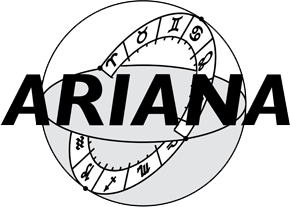

We must now approach the last age group determined by the cycles of the planets of the solar system, the one that may seem the most absurd, the most paradoxical, the most absurd. How does this period, which extends from one hundred and sixty-four years, the duration of the sidereal cycle of Neptune, to two hundred and forty-nine years, the duration of that of the planet pluto, can it concern the individual? No one can testify, with supporting evidence, of what may or may not happen two hundred years from now. The embodied individual has long since ceased to exist, unless he has reincarnated (it is according to beliefs). If reincarnation is just another consoling myth, all that remains of him is his grave and perhaps a few memories in the memory of others. A single certainty: between one hundred and sixty-four and two hundred and forty-eight years, the individual now belongs to the domain of the unknown, while the following generations, made up of billions of individuals who believe themselves to be unique and irreplaceable, continue to live.

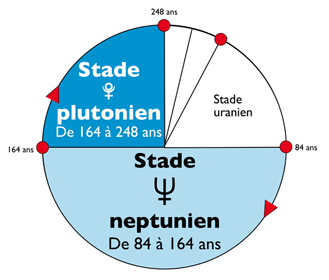
Death does not exist. It’s just a word for the absolute unknown. As the philosopher Emmanuel Lévinas writes very well, “Death is the most unknown of unknowns. It is even more unknown than any unknown…death is first of all the nothingness of knowledge. I will not say that it is nothing. It is also the ‘plenitude of the question’, but first of all: ‘we don’t know’… Death is the inexorable… death is the hole that undoes the system, the disturbance of all kinds, the dismantling of all totality.”
The morbid and frightening image that is most often stuck on death is due to the confusion we have between dying and dying. Dying is our last act, which engenders the corpse, this terrifying presence of absence. Dying is a Neptunian experience, the ultimate experience of the living. Death is not an act, but a state, and it has no biological body; it is not the presence of absence, but the maintenance and renewal of absence. What is death? There is no certain answer to this question. It is absolute uncertainty, and at the same time, death is the only absolute certainty of Man. While he lives, he can doubt everything, except that he must die one day: such is the universal law.
The Plutonian stage is for the individual that of pure metaphysics, in the etymological sense of this word: metaphysical means in Greek “what comes after physics”. It poses the problem of the Being of things and people: what remains of an individual when he has totally disappeared as a being of flesh? His Being, his Soul? Or is there nothing left at all? Is the Soul so intimately anchored to the body that it disappears with it in the act of dying, or does it regain its freedom when it divorces existence?
Death disturbs. Death worries. Death fascinates. As soon as we are born, we are potential dead, and we spend our life trying to forget it, while man is probably the only animal that knows he is going to die. The thought of our own death strips us bare, brings us back to what is essential in us: we do not cheat with death. It radically sends us back to our authenticity stripped of all artifice: “There is undoubtedly his dignity there: that Man does not elude the unanswered, that he finds on the contrary the deepest place of his being. it does not depend only on man to respond to man, but on death to respond to death, that is to say, on transcendence to respond to what transcends us.” (Chabanis).
Seen from life, death destroys all ideals, all meanings, all orders, all systems, all values, all projects, all norms. In this sense, death is a-normal. She respects nothing, not even the most beautiful feelings. It disintegrates attachments, deprives us of our affects, of our emotions. Seen from life, death is horror, the unacceptable, the unintegrable. The individual conscience would like to be immortal: death is taboo, only others die… until the moment when you have to accept the evidence and the imminence of your own death. Death lurks deep in our unconscious, in our autistic memory. It is reviled, reproved, persecuted—especially in our Western civilizations, where it seems absurd, unjust, arbitrary: how, it takes a lifetime to unify an individual, a consciousness, and death returns this hard-won uniqueness to the primordial multitudes? Disappearance of individuals, but also disappearance of species. “Dust, you are dust and you will return to dust…”
We are constantly in subtle, insidious and impalpable communication with death. We must still lend an ear to listen to what it silently whispers to us: that all our intellectual constructions, our beliefs, our certainties, our opinions, our judgments, but also our actions, our ambitions, our questions, our loves and our hatreds have somewhere strictly no meaning, no importance. Death, taking over from life, can sweep them away in the blink of an eye. Death whispers to us the ridiculousness and futility of our lives. It forces us to be humble. Everything that is so important to humans does not matter to her. An individual has certainly disappeared, but the reality itself remains. The unalterable order of the universe survives this insignificant disappearance. The immense cosmos existed before him and has no need of this being of flesh endowed with consciousness to continue to exist. This is why death opens us to the infinite, to eternity, to timelessness, to the impersonal.
Death is absolute distancing, an invitation to travel, to a radical change of scenery in the lands of mystery, the occult, the unknown. The journey to the end of the night is perhaps the rising of a new dawn. Death is initiation. By it, we leave the world of the known for that of knowledge in itself of the order of the world, that which is conditioned neither by the mental formations determined by the socioculture of a given era, nor by the deforming prism of the five senses.
With the plutonian function, each of us harbors deep within himself the consciousness of his mortality. A part of ourselves can therefore contemplate the theater of life with the eye of a dead person. Cold, lucid, caustic, distant gaze: we have no illusions about anything or anyone, we are only interested in behind the scenes, in what others are hiding or hiding. Then, everything depends on the individual way of reacting to this death that he carries within himself through the Plutonian function. Some thus fall into despair or absolute nihilism: since everything is doomed to final annihilation, nothing is worth anything. No need to make plans, to love or to act: all this is only a ridiculous and sinister masquerade. All that remains is to take refuge in an icy solitude haunted by the consciousness of the absurd, in a silent pain that nothing can cure, in the anguished expectation of the end of all things.
Others give the empty container of death another personal content, which induces a different attitude towards life. Lucid and philosophical, they nevertheless cultivate ideals while secretly knowing their relativity, make plans without investing themselves totally in them, always leaving themselves the freedom to change direction at any time, love without getting attached because they know deeply that nothing lasts forever, act without any illusions about the real effectiveness of their actions, pursue and realize their ambitions while always being aware of their vanity, wonder about the mysteries of things by not ignoring not that every answer implies new questions, convinced that deep down you never know.
Others fall into absolute cynicism, complete a-morality or abnormality: since nothing in this world has the slightest importance, the slightest value, everything is possible, everything is permitted! These will be reproached for their inhumanity, their lack of principles and scruples, their tortuous opportunism, their taste for manipulation, conspiracy, their monstrous egocentrism which is not bothered with any compassion. They don’t care, convinced that everyone is alone with their destiny and that you have the absolute right to do what you want with your life and that of others.
Some still play the inquisitive and disturbing gurus, drunk with the power conferred on them by their familiarity with the occult, the mystery, the hidden, pulling strings in the shadows. But the Plutonian function can still be lived in another way: by a deaf and deep rebellion against all hypocrisies, by a sacred and sometimes fanatical revolt. Here the “dead-in-itself” becomes desacralizing, sacrilegious, caustic, determined and ruthless destroyer of all conformisms. Nothing finds favor in his eyes: the Tables of the Law are for him only vulgar human scribbles devoid of any deep meaning. Irreducibly marginal, fundamentally atypical, irretrievable for the social consensus in place, it has definitely settled in the court of the unknown to put the known on trial. Gifted at putting his finger on the microscopic grain of sand that can derail the most beautiful machines, he is fundamentally disturbing, but also powerfully stimulating and creative.
Are there still other ways of experiencing the Plutonian function? Of course: multitudes. This awareness of death within us can, for example, incite us to the deepest humility, to silence, to meditation, to serene, distant and detached contemplation. It is then the figure of “old sage”, of the initiate disconnected from the appearances of the sensible world, freed from parasitic thoughts and emotions, of the mystic whose individual soul has merged into the universal soul. Having extinguished in him all desire, all project, all personal will, he listens to the thousand tenuous and essential rustlings of the Invisible, the only dimension of man that really counts in his eyes.
There are also those who manifest themselves by an ego refractory to any learning, to any external influence. These live the absurdity of their lives without ever asking themselves the question: what’s the point? Imbued unconsciously with a deep sense of inexorable fatality, they are content to exist while always being elsewhere, insensitive and unwavering, wildly and instinctively independent, absolutely asocial. Distant, secret, irreducibly marginal, familiar with the night, with danger, with the bizarre, they have their own laws, their own standards. Primitive, neither intellectual, nor sentimental, nor emotional, they are content to be “human beasts” authentic, resistant to any acculturation.
The Plutonian function can also be more simply an immense void that one feels within oneself and within everything, whatever the circumstances. A flaw, a gap, a lack, something that irretrievably escapes consciousness; like a permanent phase shift vis-à-vis any common purpose, any shared emotion. A mystic said about this: “I have an emptiness in my heart that has the form of God”… Another: “God created the world as the sea creates the beach: by withdrawing.” God would then be for the Plutonian believer the great Absent, invisible, impalpable, inexpressible, the integral mystery which would give the world its discreet but profound meaning. It is true that for those who have faith, God is, like death, the only true certainty.
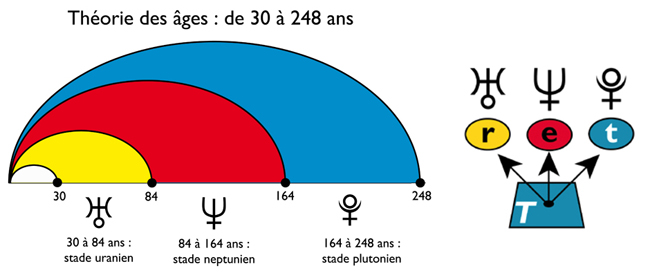
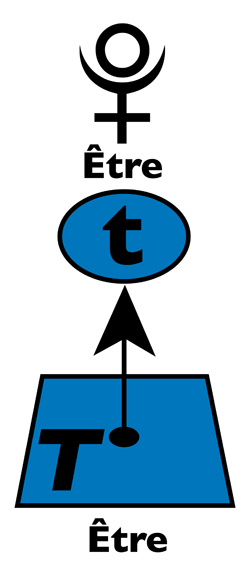
We are in plutonian state, like a “dead” from 164 to 248 years, when we feel light years away from any certainty, when something in us stubbornly refuses to register and recognize itself in what we say, do and feel as well as in what we say, make and feel others. We are in a plutonian state when an unfathomable distance separates us from everything that seems normal, accepted, agreed, when the fact of adhering to anyone or anything triggers deep within us an insurmountable reluctance, a refusal silent and obstinate. We are in a plutonian state in situations where we perceive ourselves as radically alien to this world, to its problems, its joys and its sorrows, as if the essential part of ourselves, the hard core of our individuality, in fact inhabited another planet, another time, another era.
We are still in a plutonian state when we are on the lookout for what is insidiously brewing around us, when we are convinced that in each being, each thing and each situation hides a part of mystery that must be flushed out, an underside of the decor that must be discovered, of the dark backstage that must be explored. We are in a Plutonian state when we cultivate absolute skepticism, to the point of doubting the very virtues of skepticism, when we are disillusioned, when we give no credit to appearances, when we feel inhabited by an absolute or an essential that haunts without ever revealing itself. We are in a plutonian state when we try to analyze or contemplate the world and the beings that populate it with maximum lucidity, without trusting our emotions, our sensations and everything that we have been taught. We are in a plutonian state when we act insidiously on those around us, with innuendo, subtle maneuvers and deafening unspoken words.
We are always in a plutonian state when we find that everything is both derisory and enigmatic, when we know that beings and things are always more complex than they appear, when absolutely nothing seems limpid, clear, obvious to us. and especially not what seems to be for others. We are in a plutonian state when we have the tenuous, subtle but powerful impression that our life does not belong to us, that everything is unfolding according to plans that we do not know, that it is an obscure unconscious that dictates our actions, our thoughts, our behaviors. We are in a plutonian state when we are face to face with ourselves, in this secret inner place where masks fall, where no one can lie to each other or tell stories. We are in a plutonian state when we are shifted, out of phase, disconnected from any social, active or affective life, when we find ourselves on the margins, atypical, abnormal.
Finally, we are in a Plutonian state when we are intimately resistant to any definitive commitment, when we do not even manage to get really involved in the situations we live in, the words we say, the feelings we experience, when everything that surrounds us only inspires us with a thick and immense indifference, a boundless disinterest, a feeling of unlimited absence. We are in a plutonian state when we are prey to the vertigo of nothingness, when everything seems intrinsically absurd to us or charged with a hidden meaning, an underground order, an invisible dimension which is the only reality that matters, the only fundamental issue of life.
Those with a strong and dominant Pluto in their birth chart are aloof, cold, subtle, enigmatic, skeptical, inquisitive, fiercely independent. If they do not cultivate a taste for the shadows and behind the scenes, they possess the art of disturbing, worrying, making themselves look bad, marginalizing and rejecting by right-thinking people or by those who do not support tortuous maneuvers and the taste for conspiracies. With a weak and non-dominant Pluto, one may tend to ignore, dismiss or underestimate the power of the occult, the mysterious, the hidden, to disregard minute yet essential details, to always later the deep face-to-face with oneself, to barricade oneself against all the forms that the unknown can take.
▶ The Plutonian: Psychological profile
▶ The plutonian function ‘tT’ (transcendence of Transcendence)
▶ Uranian stage (from 30 to 84 years old): the age of individualization
▶ Uranus-Neptune-Pluto: extensive Transcendence
▶ Mercury-Saturn-Pluto: intensive transcendence
▶ Sun-Mars-Pluto: extensive Power
▶ Introduction to the Theory of Planetary Ages
▶ L’échéancier planétaire et la Théorie des âges
▶ Chronologie des Aspects et Transits
▶ La déplanétisation de Pluton, une décision hystérique
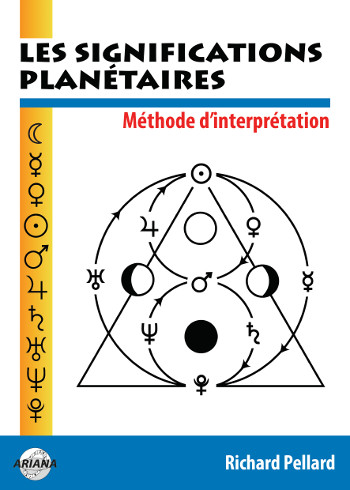
Les significations planétaires
par
620 pages. Illustrations en couleur.
La décision de ne traiter dans ce livre que des significations planétaires ne repose pas sur une sous-estimation du rôle des Signes du zodiaque et des Maisons. Le traditionnel trio Planètes-Zodiaque-Maisons est en effet l’expression d’une structure qui classe ces trois plans selon leur ordre de préséance et dans ce triptyque hiérarchisé, les Planètes occupent le premier rang.
La première partie de ce livre rassemble donc, sous une forme abondamment illustrée de schémas pédagogiques et tableaux explicatifs, une édition originale revue, augmentée et actualisée des textes consacrés aux significations planétaires telles qu’elles ont été définies par l’astrologie conditionaliste et une présentation détaillée des méthodes de hiérarchisation planétaire et d’interprétation accompagnées de nombreux exemples concrets illustrés par des Thèmes de célébrités.
La deuxième partie est consacrée, d’une part à une présentation critique des fondements traditionnels des significations planétaires, d’autre part à une présentation des rapports entre signaux et symboles, astrologie et psychologie. Enfin, la troisième partie présente brièvement les racines astrométriques des significations planétaires… et propose une voie de sortie de l’astrologie pour accéder à une plus vaste dimension noologique et spirituelle qui la prolonge et la contient.
Téléchargez-le dès maintenant dans notre boutique
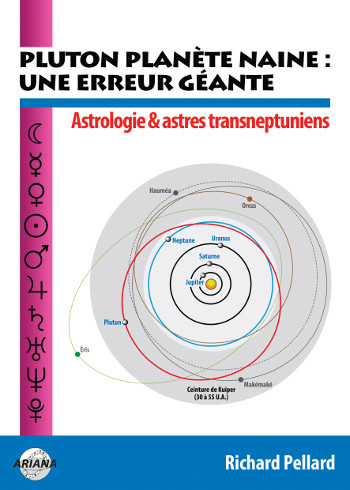
Pluton planète naine : une erreur géante
par
117 pages. Illustrations en couleur.
Pluton ne fait plus partie des planètes majeures de notre système solaire : telle est la décision prise par une infime minorité d’astronomes lors de l’Assemblée Générale de l’Union Astronomique Internationale qui s’est tenue à Prague en août 2006. Elle est reléguée au rang de “planète naine”, au même titre que les nombreux astres découverts au-delà de son orbite.
Ce livre récapitule et analyse en détail le pourquoi et le comment de cette incroyable et irrationnelle décision contestée par de très nombreux astronomes de premier plan. Quelles sont les effets de cette “nanification” de Pluton sur son statut astrologique ? Faut-il remettre en question son influence et ses significations astro-psychologiques qui semblaient avérées depuis sa découverte en 1930 ? Les “plutoniens” ont-ils cessé d’exister depuis cette décision charlatanesque ? Ce livre pose également le problème des astres transplutoniens nouvellement découverts. Quel statut astrologique et quelles influences et significations précises leur accorder ?
Enfin, cet ouvrage propose une vision unitaire du système solaire qui démontre, chiffes et arguments rationnels à l’appui, que Pluton en est toujours un élément essentiel, ce qui est loin d’être le cas pour les autres astres au-delà de son orbite. Après avoir lu ce livre, vous saurez quoi répondre à ceux qui pensent avoir trouvé, avec l’exclusion de Pluton du cortège planétaire traditionnel, un nouvel argument contre l’astrologie !
Téléchargez-le dès maintenant dans notre boutique